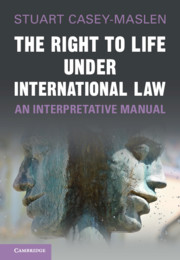Book contents
- The Right to Life under International Law
- The Right to Life under International Law
- Copyright page
- Contents
- Foreword
- Acknowledgements
- Table of Cases
- An Historical Introduction to the Right to Life
- Part I Overview of the Right to Life under International Law
- Part II Major Themes
- 5 Deaths as a Result of Armed Conflict
- 6 Jus ad Bellum, Aggression, and the Right to Life
- 7 The Use of Force in Law Enforcement
- 8 Counterterrorism
- 9 The Death Penalty
- 10 Deaths in Custody
- 11 Abortion
- 12 Euthanasia and Suicide
- 13 Poverty and Starvation
- 14 Assemblies, Demonstrations, and Protests
- 15 Arms Control and Disarmament
- 16 Enforced Disappearance
- 17 Accidents, Disease, and Natural Disasters
- 18 Pollution and Climate Change
- 19 Autonomous Use of Force
- 20 Slavery
- Part III The Protection of At-Risk Groups and Individuals
- Part IV Accountability
- Part V Human Rights Machinery Protecting the Right to Life
- Part VI Outlook
- Index
7 - The Use of Force in Law Enforcement
from Part II - Major Themes
Published online by Cambridge University Press: 02 September 2021
- The Right to Life under International Law
- The Right to Life under International Law
- Copyright page
- Contents
- Foreword
- Acknowledgements
- Table of Cases
- An Historical Introduction to the Right to Life
- Part I Overview of the Right to Life under International Law
- Part II Major Themes
- 5 Deaths as a Result of Armed Conflict
- 6 Jus ad Bellum, Aggression, and the Right to Life
- 7 The Use of Force in Law Enforcement
- 8 Counterterrorism
- 9 The Death Penalty
- 10 Deaths in Custody
- 11 Abortion
- 12 Euthanasia and Suicide
- 13 Poverty and Starvation
- 14 Assemblies, Demonstrations, and Protests
- 15 Arms Control and Disarmament
- 16 Enforced Disappearance
- 17 Accidents, Disease, and Natural Disasters
- 18 Pollution and Climate Change
- 19 Autonomous Use of Force
- 20 Slavery
- Part III The Protection of At-Risk Groups and Individuals
- Part IV Accountability
- Part V Human Rights Machinery Protecting the Right to Life
- Part VI Outlook
- Index
Summary
Excessive use of force by the police or other law enforcement officials may have lethal outcomes. This chapter describes the core law enforcement principles of necessity and proportionality which govern all use of force in law enforcement. Specific consideration is given to the restrictions imposed on the use of firearms and related ammunition and firing modes. Consideration of less-lethal weapons in law enforcement benefits from the expertise of Dr Abi Dymond of Exeter University. The human rights principles of legality, precaution, and accountability for the use of force are also addressed.
- Type
- Chapter
- Information
- The Right to Life under International LawAn Interpretative Manual, pp. 141 - 179Publisher: Cambridge University PressPrint publication year: 2021

